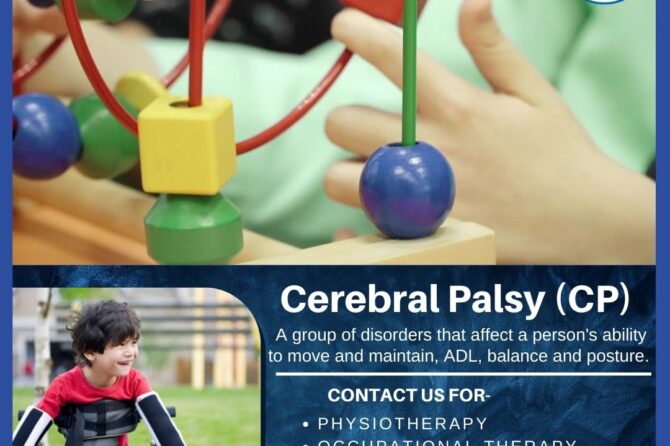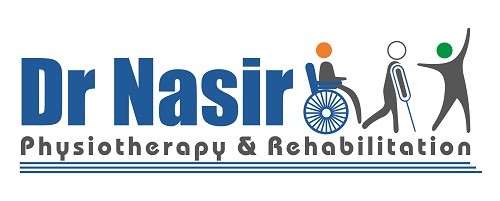
Cerebral Palsy Treatment in Dwarka Uttam Nagar Janakpuri Vikaspuri Delhi
Cerebral Palsy Treatment in Dwarka Uttam Nagar Janakpuri Vikaspuri Delhi
If you are searching for Cerebral Palsy Treatment in Dwarka Uttam Nagar Janakpuri Vikaspuri Delhi, then your search is over here. First, we have to know what Cerebral Palsy is.
Cerebral Palsy
Due to the permanent non-progressive cerebral dysfunctions which develop before the maturation of the Central Nervous System, a group of permanent disorders affecting the locomotor system is seen to be affecting the physical ability of the human race, this is termed Cerebral Palsy.
The brain lesions aren’t progressive but can cause gross and fine function impairments along with cognition, seizure, vision, speech, bowel & bladder dysfunction, etc.
Main Cause for Cerebral Palsy
• Maternal infections
• Inflammation of placenta
• Rh incompatibility
• Diabetes during pregnancy
• Genetic causes
• Exposure to radiations
• Maternal jaundice
• Prematurity
• Asphyxia
• Maconeum aspiration
• Birth trauma
• Disproportion
• Breech delivery
• Coagulopathy
• Road traffic accidents
• Shaken baby syndrome
• Lead exposure
• Meningitis
• Encephalopathy
• Cerebral haemorrhage or trauma
Classification of Cerebral Palsy
Cerebral palsy can be categorized on the basis of
Topographical Distribution –
• Monoplegic – single limb is affected
• Diplegic – only the lower limbs of the body are affected, no effect on the upper body
• Hemiplegia – right side or side is generally involved
• Triplegia – usually bilateral lower limbs and unilateral upper limb is affected, making three limbs affected
• Quadriplegia- all four limbs of the body are affected
Muscle Tone –
1. Spastic Cerebral Palsy-
In this type the cerebral cortex of the infant is affected, it is the most commonly seen in 70-80 % of the children. It can be monoplegic, diplegic, hemiplegic, triplegic or quadriplegic.
Signs and symptoms-
• Hypertonia
• Exaggerated reflexes
• Positive Babinskis
• Clonus
• Poor voluntary movement
• Scissoring gait
• Low intelligence and loss of memory
• Epilepsy
• Contractures
2. Athetoid /Diskinetic Cerebral Palsy-
Commonly seen in 10-20 % of the population, majorly an after effect of damage to extrapyramidal motor system and pyramidal tract. The infant shows involuntary movements due to mixed tone.
Signs and symptoms-
• Limbs, face, speech, and tongue are affected
• Continuous worm-like movements are often seen
• Postural instability
• Decreased movement in prone position
• Low to high tone fluctuations
• Decreased stability
• Difficulty looking up
• Delayed head and trunk control
3. Ataxic Cerebral Palsy-
Least of all, seen in just 10% of the population where children have hypotonia and tremors caused due to damage to the cerebellum.
Signs and symptoms-
• Loss of coordination
• Hypotonia
• Tremors
• Nystagmus
• Diminished reflexes
• Speech, visual, and hearing problems
• Joint hypermobility
• Dysmetria
• Incontinence
• Postural instability
• Gait problems due to unsteadiness
• Balance issues
• Loss of trunk control
4. Hypotonic Cerebral palsy-
Limping musculature leads to a floppy character in muscles, caused due to widespread damage in CNS
Signs and symptoms-
• Floppy muscles
• Gripping problems
• Loss of trunk control
• Delayed head control
• Drooling
• Speech and swallowing problems
• Poor posture
• Improper gait
• Balance issues
5. Mixed Cerebral Palsy-
Signs and symptoms of spastic cerebral palsy are often mixed with athetoid cerebral palsy in mixed cerebral palsy.
We at Dr. Nasir Physiotherapy & Rehabilitation (DNPR) have Highly experienced Paediatric Physiotherapists and Neuro Physiotherapists for Cerebral Palsy Treatment in Dwarka Uttam Nagar Janakpuri Vikaspuri Delhi
Risk factors of Cerebral Palsy
• Less birth weight
• Less gestational period
• Intracranial haemorrhage
• Muscle tone abnormalities
• Recurrent seizures after birth
• Meningitis
• Hydrocephalus
• Microcephaly
• Chromosomal abnormalities
• HIV Infection
• Brachial plexus injury
• Multiple births
• Less parental age
• Alcohol or drug abuse of mother
Management of Cerebral Palsy
1. Medical Management-
• Baclofen
• Diazepam
• Botox
• Levodopa
2. Surgical Management-
• Dorsal rhizotomy
• Joint and tendon release surgeries
• Insertion of baclofen pump
• Bony corrections
3. Physiotherapy Management-
Highly experienced Paediatric Physiotherapists and Neuro Physiotherapists at Dr Nasir Physiotherapy and Rehabilitation for Cerebral Palsy Treatment in Dwarka Uttam Nagar Janakpuri Vikaspuri Delhi
work on the –
• Behaviour of the child
• Communication of the child
• Involuntary movements
• Deformities
• Postural faults
• Gait abnormalities
• Positioning of the child
• Body alignment
• Fear of fall due to poor balance
• Attitude of limbs
• Higher cognitive functions
• Co ordination
• Sensory aspects
• Locomotion
• Cranial nerve integrity
• Motor integrity
• Reflex integrity
• Range of motion and flexibility
Over the past 12 years, we have successfully recovered many children suffering from cerebral palsy, a condition that drains you physically as well as emotions, wherein recovery means new life.
We provide Physiotherapy, Occupational Therapy, Speech Therapy and Special Education to children with our highly qualified and experienced team. in the area of VIKASPURI Najafgarh, Vikas Nagar Uttam Nagar, Janakpuri Dwarka
Physiotherapy at the home facility is also available.
Leave a reply

Leave a reply